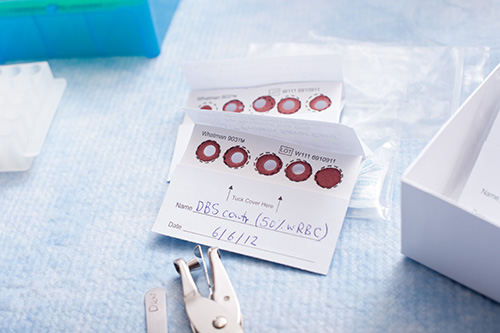Biobehavioral (Biomolecular) Lab
The Biomolecular Lab provides comprehensive, reliable Dried-Blood Spot (DBS) analysis that gives investigators biomarker data (measuring chronic stress, total cholesterol, immune markers and other health indicators) to inform and advance their work.
A Bio-Safety Lab Level 2 (BSL2) certified research laboratory within the University of Rochester School of Nursing provides support for researchers conducting bio-behavioral research by providing biospecimen analyses for a variety of analytes.
Biomarkers assist researchers in understanding the interaction between environmental, socio-economic, demographic, and cultural factors with biology and how they influence health outcomes.
The impact of biomarkers is considerable in helping multidisciplinary researchers explore relationships of disease and risk factors, disease and treatment interventions, prevention programs, and environmental factors, and their impact on health.
What we offer
Under the direction of Dr. Susan Groth, lab director, and Christopher Lane, lab manager, we provide consulting and guidance to investigators seeking to include biomarkers in their research studies from concept development to implementation, evaluation, and interpretation of laboratory values.
Our lab has the equipment necessary to establish and perform analyses on biomarkers: storage freezers, microplate reader, automatic plate washer, and standard biochemistry equipment.
As a certified BSL2 facility, the lab can provide analyses of dried blood spots (DBS) and human blood derivatives such as serum or plasma.
We also provide you:
- Expert consultation on the best methods of DBS sample collection and storage (based on populations and research focus), study goals, necessary applications, and cost
- Protocols for analytes HbA1c, total cholesterol, triglycerides, interleukin-6, interleukin -1 beta, C-reactive protein
- Creation of new assays as requested
- Reliable, comprehensive data analysis of collected samples
- Assistance and support with data interpretation
- A finalized dataset of biomarkers upon completion
- Long-term, secure, freezer storage of samples for future analysis
Our approach
We have expertise in the use of various techniques that enhance inclusion of biological markers in research studies. These techniques include:
The experienced lab technicians worked closely with us to assure high quality data and efficient work completion. From storage and assay planning to data analysis, the staff has always been available to support our projects and any troubleshooting without pause.
Contact us
The Biomolecular Laboratory is located on the fourth floor of the University of Rochester School of Nursing’s Helen Wood Hall.
To request lab services for your study, cost estimates, or to learn more about the Biomarker Lab, please contact:
Susan W. Groth
Director, Biomolecular Laboratory
Professor
University of Rochester School of Nursing
601 Elmwood Avenue, BOX SON
Rochester, NY 14642
Susan_Groth@urmc.rochester.edu
(585) 275-8895


